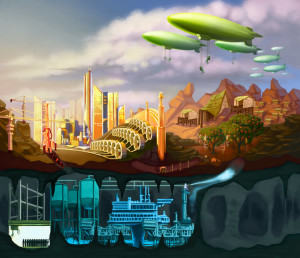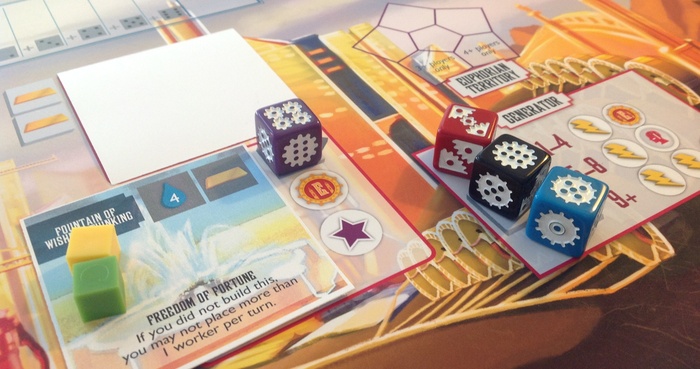At some point in the future, something really bad happens to society. Chances are we did it to ourselves, but regardless of the cause, our world – this world – is no more. From the ashes of civilization grew a new city. A city determined to not make the same mistakes; a city determined to usher us forward. A city called Euphoria. A city that probably has this song as its anthem…
Well, if the music survived anyway.
A lot of other things didn’t.
Most, in fact.
Things like history, liberty, and individual opulence.
You’re still an individual though.
You’re just like like all the other individuals in the city: identical and unique.
And, really, most are ok with that…
 Euphoria is a dice-based worker placement game set in a futuristic dystopian society.
Euphoria is a dice-based worker placement game set in a futuristic dystopian society.
Building upon the success of putting a spin on the traditional worker placement model in Viticulture, Stonemaier Games follows up with this bleak worldview. It may not fare well for the workers involved, but for you at the top, you’ll be pleased with a game that evokes both a strong theme and strategic decision-making fun.
The Euphorans won’t like us divulging secrets, but we’re going to anyway. So here’s three things make Euphoria stand out as an interesting game:
#1: The Interplay
Firstly is the way the game’s worker placement ties different players together. Each player at the start of the game gets two Recruits of one of the four possible game factions, and each has varying abilities. Think of them as loyal henchmen. (And honestly, who doesn’t love a good henchman?) The catch is that at the start of the game, only one Recruit is known to all players; the other is secret.
The factions gain influence through player actions, but while it’s obvious which factions players are advancing for their own ends initially, it’s also possible that you’re helping to advance the hidden Recruits of other players. If a faction reaches a certain level of influence, that Recruit is revealed, and that player gains more special abilities from the second Recruit. That feeling of the unknown adds some game tension as you progress through the game. Are you inadvertently helping the enemy, or a comrade-in-arms? It’ll be this question that plagues you as you decide which resources to gather and whether to assist others in constructing new locations on the board.
#2: The Dice
Second: the dice placement mechanic itself. Euphoria’s dice represent your unnamed workers at any given time. Say hello drones!
Rather than rolling dice to match numbers for actions (like, say, Alien Frontiers), the numbers instead represent the knowledge of the worker at that time. Though some Recruit abilities work around replacing a worker with a higher or lower knowledge than yours, the larger issue is fear of your Overall Knowledge. That is, if the total value of your workers reaches a certain level, one runs away. The strain of knowing things was just too much, and you’ll have to replace them. Unfortunately, some of the more powerful abilities on the board raise your knowledge level. This forces you to balance the desire for worker units with the desire for more potent actions.
#3: The World
Lastly, of course, is the obvious theme: Euphoria’s dystopian flavor resonates with the game thematically and mechanically.
Each of the factions is looking to outmaneuver one another for dominance over the future of humanity, and this is depicted through various actions on the board itself. It’s apparent that thought went into the background of the world portrayed. The farther along the game progresses, the more players feel invested into whichever factions their Recruits belong to. Will you serve The Establishment, or will you participate in the search for The Truth? (We hear it’s out there.)
Euphoria is another creative take on worker-placement games, and it’s now your choice whether you want to educate its masses. Do you think your people are ready for the rude awakening about their precious city? If so, consider checking out this Kickstarter. If not, we believe the Pool of Near-Tepidness needs cleaning. Chop chop.


